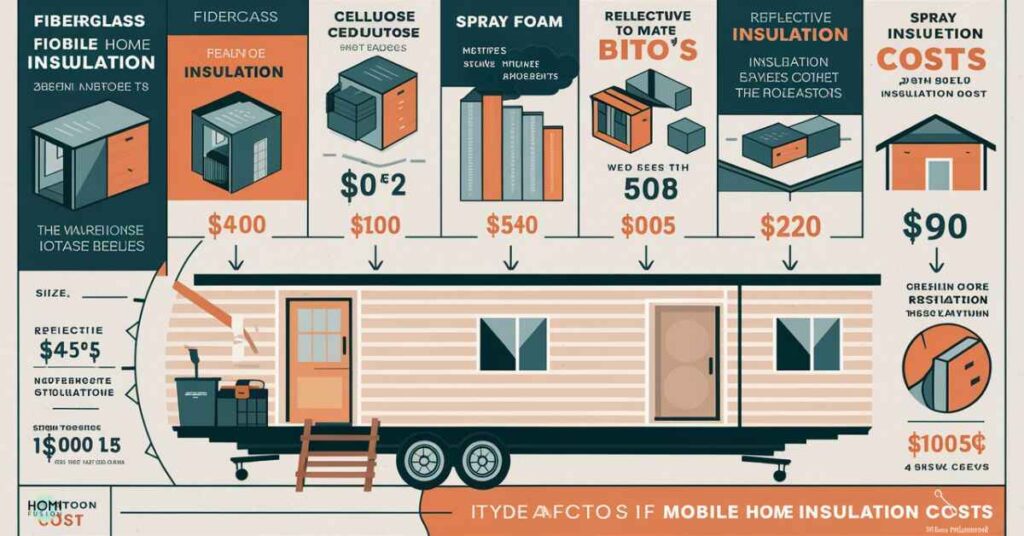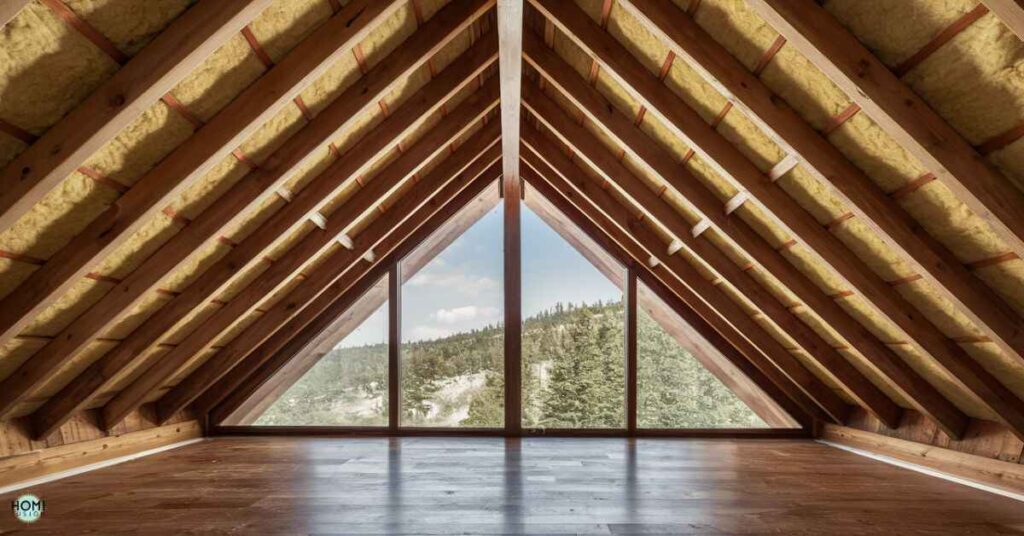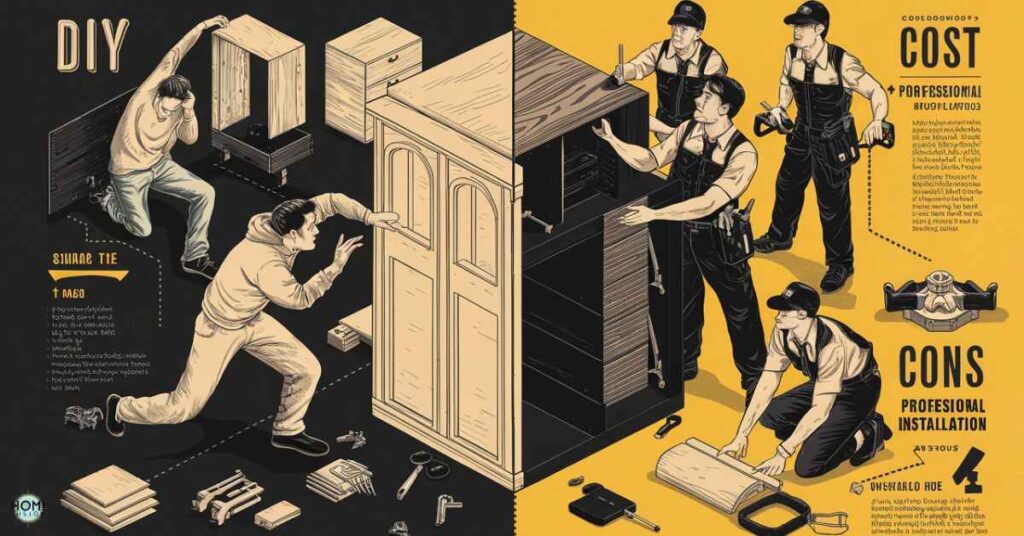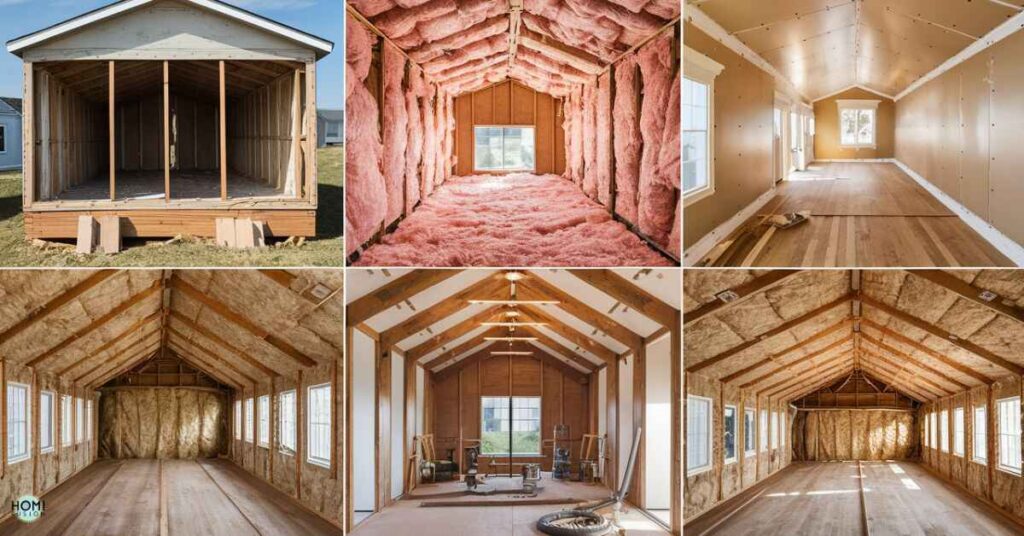Ahh, the joys of mobile home living-freedom, flexibility and a cozy abode to call your own. But let’s be honest, those paper-thin walls and drafty windows can make staying comfortable a real challenge, not to mention the skyrocketing energy bills.
Fear not, my friend! Proper insulation might just be the solution you’ve been searching for. In this comprehensive guide, we’ll dive deep into the nitty-gritty of mobile home insulation costs, exploring every nook and cranny to help you make an informed decision.
Insulation is like a warm blanket for your home, keeping the heat in during those chilly months and the cool air locked inside when the sun is blazing. But before you take the plunge, it’s crucial to understand the factors that can impact the overall cost.
From the size of your mobile home to the type of insulation material, we’ll uncover it all. So, grab a cozy seat, and let’s embark on this insulation adventure together!
Factors That Affect Mobile Home Insulation Costs

When it comes to mobile home insulation costs, one size definitely doesn’t fit all. Several key factors come into play, each contributing to the overall price tag. Let’s take a closer look:
Size of the Mobile Home
Just like everything else in life, size matters-at least when it comes to insulation expenses. A single-wide mobile home will naturally require less insulation material and labor compared to a double-wide or even a triple-wide unit. This means that a smaller home will typically have a lower overall cost for insulation installation.
Type of Insulation Material
The insulation world is a diverse one, with options ranging from traditional fiberglass batts to cutting-edge spray foam. Each material comes with its own set of pros, cons and of course, price points. Generally speaking, spray foam insulation tends to be more expensive upfront but offers superior insulation performance and air sealing capabilities.
Here’s a quick rundown of some common mobile home insulation types and their approximate costs per square foot:
Fiberglass Batts: $0.50 – $1.00
Cellulose Loose-fill: $1.00 – $1.50
Open-Cell Spray Foam: $0.35 – $0.65
Closed-Cell Spray Foam: $1.00 – $2.00
Complexity of Installation
Installation complexity can also play a significant role in determining mobile home insulation costs. If your home has easy access to the wall cavities or attic space, the installation process will likely be more straightforward and less labor-intensive. However, if there are obstacles like existing insulation or tricky nooks and crannies, the job might require more time and effort, driving up the overall cost.
Regional Labor Costs
Finally, it’s important to consider the labor costs in your specific region. Just like the cost of living, labor rates can vary significantly from one area to another. In general, urban areas with a higher cost of living tend to have higher labor costs for insulation installation compared to rural regions.
Breaking Down the Insulation Installation Process
Now that we’ve covered the key factors influencing mobile home insulation costs, let’s dive into the nitty-gritty of the installation process itself. After all, knowledge is power, and understanding what’s involved can help you make an informed decision.
Ceiling/Roof Insulation

The ceiling and roof area are often the biggest culprits when it comes to heat loss or gain in a mobile home. Proper insulation in this area can significantly improve your home’s overall energy efficiency and comfort levels.
Typical Cost Range: $1,500 – $3,000
Installation Methods:
- Blown-in insulation (fiberglass or cellulose)
- Spray foam insulation
Factors Affecting Cost:
- Size of the mobile home
- Accessibility to the attic or ceiling space
- Type of insulation material chosen
Wall Insulation
Those thin walls in mobile homes can be a real energy sipper, allowing precious heat or cool air to escape with ease. Insulating the walls is a crucial step in creating a comfortable and energy-efficient living space.
Cost Estimates: $2,500 – $4,000
Insulation Techniques:
- Drilling and filling wall cavities with blown-in insulation
- Removing siding and installing insulation batts or spray foam
Considerations:
- Type of siding material (vinyl, aluminum, wood, etc.)
- Wall structure and accessibility
Underbelly/Floor Insulation
Don’t forget about the underbelly and floor area! Proper insulation in this area can help prevent cold floors and protect pipes from freezing during those brutal winter months.
Average Pricing: $1,000 – $2,000
Approach:
- Spray foam insulation for a seamless, air-tight seal
- Rigid foam boards for a more budget-friendly option
Accessibility Challenges:
- Clearance for crawling under the mobile home
- Presence of obstructions like ductwork or plumbing
Windows and Doors Upgrades (if needed)
While not technically part of the insulation process, upgrading your windows and doors can significantly enhance the overall energy efficiency of your mobile home. These entryways can often be major sources of air leakage, undermining your insulation efforts.
Cost Range for Replacements: $1,000 – $5,000 (depending on the number of windows/doors)
Benefits:
- Improved insulation and air sealing
- Potential energy savings on heating and cooling costs
- Enhanced aesthetics and curb appeal
Financing Options and Rebates for UK/US Homeowners
Let’s face it, insulating a mobile home can be a significant investment. But fear not, my budget-conscious friends! There are various financing options and rebates available to help ease the financial burden.
Government Programs and Incentives
Both the US and UK governments recognize the importance of energy efficiency and offer programs to encourage homeowners to make eco-friendly upgrades like insulation.
In the US, the Weatherization Assistance Program provides grants to low-income households to improve their home’s energy efficiency, including insulation installation.
Similarly, the UK’s Energy Company Obligation (ECO) scheme requires energy suppliers to promote and subsidize energy-efficient home improvements, including insulation.
Utility Company Rebates
Many utility companies in the US and UK offer rebates and incentives to customers who undertake energy-saving measures like insulating their homes. These rebates can significantly offset the upfront costs of insulation installation.
For example, in the US, the Efficiency Maine Program covers between 40% to 80% of the costs associated with insulating a mobile home, with some homeowners even qualifying for 100% coverage.
Financing Plans from Insulation Companies
Don’t have the cash on hand? No worries! Many insulation companies offer financing plans to help make the investment more manageable. These plans often come with flexible payment options and low-interest rates, making it easier to spread out the cost over time.
Read this blog: What Is The Value Of My Mobile Home?
DIY vs. Professional Installation: Pros and Cons
When it comes to insulating your mobile home, you have two options: tackle the project yourself (DIY) or hire a professional insulation contractor. Both routes have their own set of pros and cons, so let’s weigh them out.

Cost Comparison
One of the most significant advantages of a DIY insulation project is the potential cost savings. By doing the work yourself, you can avoid labor costs, which can make up a substantial portion of the overall insulation expenses.
However, it’s important to factor in the cost of materials, tools and any necessary safety equipment. Additionally, if you make any mistakes during the installation process, you might end up spending more money to fix them or even compromising the effectiveness of the insulation.
Skill Level Required
Insulation installation, especially in a mobile home setting, can be a complex task. It requires a certain level of knowledge and skill to ensure proper installation and avoid potential issues like air leakage or moisture buildup.
If you’re confident in your DIY abilities and have experience with insulation projects, tackling the job yourself might be a viable option. However, for those without the necessary skills, hiring a professional contractor could be the safer and more effective choice.
Potential Risks and Pitfalls
Improperly installed insulation can lead to a host of problems, including reduced energy efficiency, moisture buildup, and even health concerns if not handled correctly. Professional insulation contractors, on the other hand, have the experience and knowledge to avoid these pitfalls, ensuring a seamless and effective installation.
Long-term Benefits of Professional Work
While hiring a professional insulation contractor might come with a higher upfront cost, the long-term benefits can often outweigh the initial investment. Professionals have access to high-quality materials and specialized equipment, ensuring that the insulation is installed correctly and performs as intended.
Additionally, many contractors offer warranties on their work, giving you peace of mind and protection against potential issues down the line. With proper installation, you can expect to enjoy the full benefits of your insulation investment, including improved energy efficiency, enhanced comfort, and potentially lower utility bills.
Real-Life Examples and Testimonials
Sometimes, numbers and statistics just don’t cut it. That’s why we’ve gathered real-life examples and testimonials from mobile homeowners who have taken the plunge and insulated their homes. Their experiences can provide valuable insights and help you better understand the potential benefits and challenges.
Case Study 1: The Parker Family, Ohio
We were hesitant about investing in insulation for our mobile home, but after enduring a few brutal winters, we decided to take the plunge”. “We opted for closed-cell spray foam insulation and let me tell you, it was worth every penny!”
(Sarah Parker)
The Parkers worked with a local insulation contractor who guided them through the process, explaining the different options and helping them choose the best solution for their needs.
Results:
- Reduced energy bills by over 30%
- Consistent, comfortable temperatures throughout the home
- Improved indoor air quality
“Our only regret is not doing it sooner!” exclaimed Sarah. The insulation has truly transformed our mobile home into a cozy, energy-efficient haven.
Case Study 2: The Johnsons, Maine
For the Johnson family, the decision to insulate their mobile home was made easier thanks to the Efficiency Maine Program. “We qualified for an 80% rebate, which made the investment much more manageable,”
(Mark Johnson)
Results:
- Substantial savings on heating and cooling costs
- Enhanced soundproofing, reducing outside noise pollution
- Increased home value and resale potential
The rebate program was a game-changer for us, Mark added. “It allowed us to make a long-term investment in our home’s comfort and energy efficiency without breaking the bank.”
These real-life examples demonstrate the tangible benefits that proper insulation can bring to mobile homeowners. From cost savings and increased comfort to improved indoor air quality and potential resale value, the advantages are hard to ignore.
Also read: What Is A Coach House?
Frequently asked questions
What is the cheapest way to insulate under a mobile home?
Using rigid foam boards is the cheapest method for insulating under a mobile home.
How much is 1000 square feet of insulation?
The cost varies by material, ranging from $350 for open-cell spray foam to $2000 for closed-cell spray foam.
What is a belly wrap for a mobile home?
A belly wrap is a protective barrier under a mobile home that prevents moisture and pests from damaging the insulation.
Can you spray insulation in a mobile home?
Yes, spray foam insulation can be used in a mobile home for effective air sealing and insulation.
What is the best wall material for mobile home?
Vinyl or drywall are considered the best wall materials for mobile homes due to their durability and ease of installation.
Conclusion
Insulating your mobile home is a smart investment that can pay dividends in the form of improved comfort, lower energy bills, and a more eco-friendly living space. While the upfront costs can seem daunting, understanding the factors that influence mobile home insulation costs can help you make an informed decision.
From the size of your home and the type of insulation material to the complexity of installation and regional labor costs, there are many variables to consider. Additionally, exploring financing options, rebates, and government incentives can help make the investment more manageable.
Ultimately, whether you opt for a DIY approach or hire a professional insulation contractor, the key is to prioritize quality and proper installation. A well-insulated mobile home can not only provide a cozy and comfortable living environment but also contribute to long-term energy savings and increased property value.







